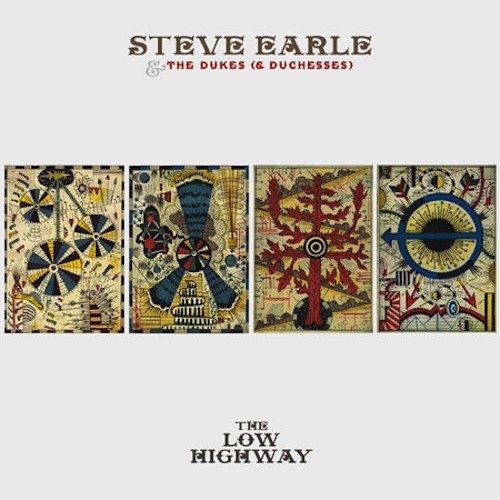Videos by American Songwriter
Steve Earle & The Dukes And Duchesses
The Low Highway
(New West)
Rating: 4 out of 5 stars
He’s such a busy guy these days, what with his acting and writing careers, that it’s possible that some younger folks might not realize that Steve Earle is one of the finest songwriters of his generation and a fearless recording artist. Those talents have been hidden somewhat in his last few releases: 2010’s I’ll Never Get Out Of This World Alive was more like a collection of stray songs than an album proper, while 2009’s Townes was a covers album featuring Steve’s old buddy and musical influence Townes Van Zandt.
The Low Highway leaves no doubt that Earle is clearly focused on his music. Whereas his original music of the past decade has had an unrelenting political bent that sometimes overwhelmed the craft behind it, he has found a way to deliver a much more balanced album this time around, probably his best in that regard since 2000’s excellent Transcendental Blues.
Earle by no means has abandoned his social concerns; in actuality, the first three songs on The Low Highway combine to create quite a damning portrait of this country. He does this not by taking pot shots at easy targets; instead, he builds his case through character sketches and telling observations. The album-opening title track, for example, takes its cue from Bruce Springsteen’s “The Ghost Of Tom Joad” in the way that the narrator catalogues the rot and desperation he witnesses. He can’t help but see “the ghost of America watching me/Through the broken windows of the factory.”
The next two songs are written from the perspective of people whose lives are filled with these ghosts. “Calico County” is a riff-heavy rocker sung by a character drawn to a life of drugs and crime simply because all exit routes from the titular hellhole have long been closed down: “Outa here someday/Ain’t that what I used to say.” The narrator of “Burnin’ It Down” is so frustrated by his situation that he lashes out at the faceless enemy: The “it” he’s considering incinerating is the local Wal-Mart, even if Earle’s dejected vocal makes it clear that this guy is probably too defeated to follow through on his threat.
Earle has assembled a crack back-up band, and they come in handy whenever he makes a stylistic detour, from the zydeco-flavored “That All You Got?” to the gentle swing of “After Mardi Gras.” An even more important ingredient to the album’s success is the songwriter’s willingness to change up his subject matter up and look inward almost as often as he does outward.
“Pocket Full Of Rain,” which rides a nifty little piano groove into some bluesy alleys, is Earle confronting the mistakes of his past head on and coming out the other side bruised but wiser. “Invisible” is moody and pretty, an unsparing look at the inner turmoil that might lead one to make those mistakes in the first place.
The Low Highway has a few time-killers here and there but is never less than expertly performed by the Dukes and Duchesses. For the most part though, Earle gives them prime material. “21st Century Blues” feels like a rip-roaring update of Neil Young’s “Rockin In The Free World,” a state-of-the-world address that name-drops the Mayans and the Maharishi but still turns up more problems than solutions. Even in a world of technological wonders, people are still “gettin’ by on just the bare minimum.”
“Remember Me” sends the album out on a moving note, presenting Earle’s fatherly advice for when he can’t be there to guide his child through life’s slings and arrows. “Remember me on some stormy night,” he sings, “When there’s no sign of shelter in sight/And you soldier on into the light ‘cause that’s all you see.”
As personal lullabies go, that one should resonate much further than its intended target and offer resilience to the types of folks that have been marginalized by the circumstances described all through The Low Highway. If you’re listening to a Steve Earle album, you know you’re going to get the truth. The good news is that this one is so powerful and varied that it will make those hard truths a little easier to bear even after the disc ends.














Leave a Reply
Only members can comment. Become a member. Already a member? Log in.